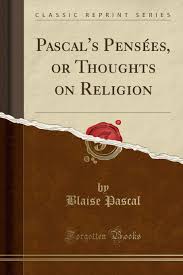Pensées Page #21
The Pensées is a collection of fragments on theology and philosophy written by 17th-century philosopher and mathematician Blaise Pascal. Pascal's religious conversion led him into a life of asceticism, and the Pensées was in many ways his life's work. The Pensées represented Pascal's defense of the Christian religion.
There is nothing more real than this, nothing more terrible. Be we as heroic as we like, that is the end which awaits the noblest life in the world. Let us reflect on this, and then say whether it is not beyond doubt that there is no good in this life but in the hope of another; that we are happy only in proportion as we draw near it; and that, as there are no more woes for those who have complete assurance of eternity, so there is no more happiness for those who have no insight into it. Surely then it is a great evil thus to be in doubt, but it is at least an indispensable duty to seek when we are in such doubt; and thus the doubter who does not seek is altogether completely unhappy and completely wrong. And if besides this he is easy and content, professes to be so, and indeed boasts of it; if it is this state itself which is the subject of his joy and vanity, I have no words to describe so silly a creature. How can people hold these opinions? What joy can we find in the expectation of nothing but hopeless misery? What reason for boasting that we are in impenetrable darkness? And how can it happen that the following argument occurs to a reasonable man? "I know not who put me into the world, nor what the world is, nor what I myself am. I am in terrible ignorance of everything. I know not what my body is, nor my senses, nor my soul, not even that part of me which thinks what I say, which reflects on all and on itself, and knows itself no more than the rest. I see those frightful spaces of the universe which surround me, and I find myself tied to one corner of this vast expanse, without knowing why I am put in this place rather than in another, nor why the short time which is given me to live is assigned to me at this point rather than at another of the whole eternity which was before me or which shall come after me. I see nothing but infinites on all sides, which surround me as an atom, and as a shadow which endures only for an instant and returns no more. All I know is that I must soon die, but what I know least is this very death which I cannot escape. "As I know not whence I come, so I know not whither I go. I know only that, in leaving this world, I fall for ever either into annihilation or into the hands of an angry God, without knowing to which of these two states I shall be for ever assigned. Such is my state, full of weakness and uncertainty. And from all this I conclude that I ought to spend all the days of my life without caring to inquire into what must happen to me. Perhaps I might find some solution to my doubts, but I will not take the trouble, nor take a step to seek it; and after treating with scorn those who are concerned with this care, I will go without foresight and without fear to try the great event, and let myself be led carelessly to death, uncertain of the eternity of my future state." Who would desire to have for a friend a man who talks in this fashion? Who would choose him out from others to tell him of his affairs? Who would have recourse to him in affliction? And indeed to what use in life could one put him? In truth, it is the glory of religion to have for enemies men so unreasonable: and their opposition to it is so little dangerous that it serves on the contrary to establish its truths. For the Christian faith goes mainly to establish these two facts, the corruption of nature, and redemption by Jesus Christ. Now I contend that if these men do not serve to prove the truth of the redemption by the holiness of their behaviour, they at least serve admirably to show the corruption of nature by sentiments so unnatural. Nothing is so important to man as his own state, nothing is so formidable to him as eternity; and thus it is not natural that there should be men indifferent to the loss of their existence, and to the perils of everlasting suffering. They are quite different with regard to all other things. They are afraid of mere trifles; they foresee them; they feel them. And this same man who spends so many days and nights in rage and despair for the loss of office, or for some imaginary insult to his honour, is the very one who knows without anxiety and without emotion that he will lose all by death. It is a monstrous thing to see in the same heart and at the same time this sensibility to trifles and this strange insensibility to the greatest objects. It is an incomprehensible enchantment, and a supernatural slumber, which indicates as its cause an all-powerful force. There must be a strange confusion in the nature of man, that he should boast of being in that state in which it seems incredible that a single individual should be. However, experience has shown me so great a number of such persons that the fact would be surprising, if we did not know that the greater part of those who trouble themselves about the matter are disingenuous, and not in fact what they say. They are people who have heard it said that it is the fashion to be thus daring. It is what they call shaking off the yoke, and they try to imitate this. But it would not be difficult to make them understand how greatly they deceive themselves in thus seeking esteem. This is not the way to gain it, even I say among those men of the world who take a healthy view of things, and who know that the only way to succeed in this life is to make ourselves appear honourable, faithful, judicious, and capable of useful service to a friend; because naturally men love only what may be useful to them. Now, what do we gain by hearing it said of a man that he has now thrown off the yoke, that he does not believe there is a God who watches our actions, that he considers himself the sole master of his conduct, and that he thinks he is accountable for it only to himself? Does he think that he has thus brought us to have henceforth complete confidence in him, and to look to him for consolation, advice, and help in every need of life? Do they profess to have delighted us by telling us that they hold our soul to be only a little wind and smoke, especially by telling us this in a haughty and self-satisfied tone of voice? Is this a thing to say gaily? Is it not, on the contrary, a thing to say sadly, as the saddest thing in the world? If they thought of it seriously, they would see that this is so bad a mistake, so contrary to good sense, so opposed to decency and so removed in every respect from that good breeding which they seek, that they would be more likely to correct than to pervert those who had an inclination to follow them. And indeed, make them give an account of their opinions, and of the reasons which they have for doubting religion, and they will say to you things so feeble and so petty, that they will persuade you of the contrary. The following is what a person one day said to such a one very appositely: "If you continue to talk in this manner, you will really make me religious." And he was right, for who would not have a horror of holding opinions in which he would have such contemptible persons as companions!
Translation
Translate and read this book in other languages:
Select another language:
- - Select -
- 简体中文 (Chinese - Simplified)
- 繁體中文 (Chinese - Traditional)
- Español (Spanish)
- Esperanto (Esperanto)
- 日本語 (Japanese)
- Português (Portuguese)
- Deutsch (German)
- العربية (Arabic)
- Français (French)
- Русский (Russian)
- ಕನ್ನಡ (Kannada)
- 한국어 (Korean)
- עברית (Hebrew)
- Gaeilge (Irish)
- Українська (Ukrainian)
- اردو (Urdu)
- Magyar (Hungarian)
- मानक हिन्दी (Hindi)
- Indonesia (Indonesian)
- Italiano (Italian)
- தமிழ் (Tamil)
- Türkçe (Turkish)
- తెలుగు (Telugu)
- ภาษาไทย (Thai)
- Tiếng Việt (Vietnamese)
- Čeština (Czech)
- Polski (Polish)
- Bahasa Indonesia (Indonesian)
- Românește (Romanian)
- Nederlands (Dutch)
- Ελληνικά (Greek)
- Latinum (Latin)
- Svenska (Swedish)
- Dansk (Danish)
- Suomi (Finnish)
- فارسی (Persian)
- ייִדיש (Yiddish)
- հայերեն (Armenian)
- Norsk (Norwegian)
- English (English)
Citation
Use the citation below to add this book to your bibliography:
Style:MLAChicagoAPA
"Pensées Books." Literature.com. STANDS4 LLC, 2024. Web. 26 Nov. 2024. <https://www.literature.com/book/pens%C3%A9es_114>.




Discuss this Pensées book with the community:
Report Comment
We're doing our best to make sure our content is useful, accurate and safe.
If by any chance you spot an inappropriate comment while navigating through our website please use this form to let us know, and we'll take care of it shortly.
Attachment
You need to be logged in to favorite.
Log In